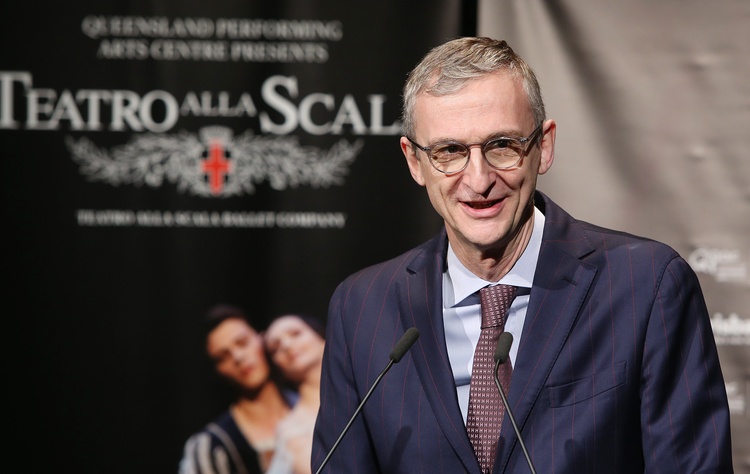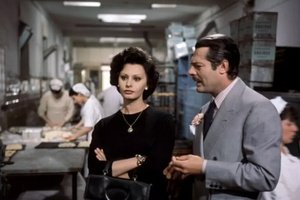First we were faced with the news of Italian shipbuilder Fincantieri’s failure to win the contract to build Australia’s next warships; then we discovered that Italian President Sergio Mattarella’s trip Down Under, scheduled for early October, had been postponed.
Gatti expressed his discontent at the above developments during his interview with Il Globo.
He admitted he was disappointed with the Australian government’s decision to give the job of building its warships to a British company, but said the postponement of the president’s visit wasn’t a direct consequence of this choice.
“It’s part of a series of events which this is also connected to,” he added.
The ambassador then explained exactly what happened.
“The first important message I have to say is this: our president wants to come to Australia very much,” he said.
“Not only does he want to come, he sees the visit as one of the most important trips of his presidential term.
“Because it’s so important, he will only come when all of the conditions allow for a successful trip.”
Gatti added that Mattarella won’t be here for pleasure, but to strengthen bilateral ties between Australia and Italy.
“That is why the decision regarding Fincantieri, which was a political one according to then prime minister Malcolm Turnbull, was so disappointing for Italy,” he explained.
“The president’s visit was then confirmed because it is easier to say things among friends if you are sitting opposite each other and not somewhere else.”
Large efforts went into preparing a program for the visit, which flagged the signing of two key agreements.
“The first is a declaration of strategic partnership between Italy and Australia similar to those signed with France and Germany,” Gatti said.
“Italy was the only of the major European partners who was missing and we felt the need to arrive at the same level of collaboration.”
The second agreement to be signed regards the defence industry.
“We saw that perhaps certain decisions may have stemmed from misconceptions regarding the capacity of Italy’s defence industry,” Gatti said.
“We highlighted that a request to sign an agreement in the defence industry had already been made in 2015, but the request went unanswered by Australia.
“Therefore, we made it clear that in order for the visit to be a success, these political choices must be made.
“When we received news that it wouldn’t be possible to go through with these agreements, it was relayed to Australians that the president would like to visit, but that it would be better to wait until 2019.”
The ambassador reaffirmed that the trip wasn’t cancelled but postponed until a more suitable time, when it will be possible to sign the accords and strengthen relations between Italy and Australia.
An offer in Australia’s best interests
The ambassador’s great disappointment in the fact that Australia assigned the job of building its new wartime ships to British company BAE Systems is due to several factors:
“We’re convinced that we [Fincantieri is an Italian company] worked hard to present something which was in the absolute interest of Australia: a strategic defence capability which would have been made operational within a very short time,” Gatti said.
“A different option was taken from what we expected... a decision which was, as confirmed, political.
“It escapes us how this decision is in Australia’s best interests, but we know that Italy made the right offer.”
It was an offer which was also a “symbol of friendship” from Italy to Australia.
“It was a great disappointment which showed us that there is still a long way to go until Australia understands at a political and institutional level what Italy is today and what it can offer.”
Gatti spoke of a need on behalf of everyone to continue this work until we overcome the many stereotypes which are still associated with Italy.
Just a few weeks ago, in Canberra, Gatti outlined to the prime minister a list of things which show the other side of Italy, beyond pizza, fashion and Ferraris.
He mentioned Italian companies Enel, which is building the largest solar power plant in this continent, and Prysmian, which is constructing the cables for Australia’s NBN.
He also highlighted that Italy is the second-largest industrial producer in Europe after Germany, and the country which exports more to Australia than France does.
Gatti, who lived in Milan for eight years and played an integral role in the success of the city’s Expo, assured us that this experience would help him in his new role in Australia.
“The 2015 Milan Expo was an example of how Italy is capable of doing big things and organising big projects if we work together,” Gatti said.
“Above all, it was an example of cooperation between the public and private systems.
“I will bring this to Australia. It is an important part of the role which I have been entrusted with.”
It is important because there is a growing interest among Italian companies towards Australia.
In the last five to six years, the number of Italian companies in Australia has risen from 150 to 200 and in several years to come that number will rise again to 250.
“We’re talking about companies that have come here, and operate in this country, not those who export Italian products to Australia, of which there are thousands,” Gatti said.
The ambassador then spoke of the big news regarding Intesa Sanpaolo, Italy’s largest bank.
He said the bank intends to begin operating Down Under and has already presented its proposal to Australian authorities.
The proposal aims to assist Italian companies, who are becoming ever more present in Australia, as well as Australian companies, who are becoming increasingly interested in Italy.
On flying direct to Rome
Another topic touched on in the interview was the possibility of resuming direct flights from Perth to Rome, a project which Gatti is already working on.
In fact, in the coming weeks, the ambassador will meet with representatives of Qantas, which is considering new flights to Europe.
He revealed a ratio of three or four to one in favour of the initiative.
However, he said that this is perhaps less important than the investments made, or those which could be made, in Australia, and the opportunities to use this country as a bridge between Europe and Asia.
For this reason, companies like Eni have already set up offices here also for their operations in South East Asia.
Fincantieri had planned to do the same thing, and it was a huge missed opportunity for Australia.
Gatti noted that the relationship is a two-way street and that Australia, despite being one of the biggest overseas investors, is yet to invest much in Italy.
Therefore, while there is great satisfaction in the constant rise in Italian companies in Australia, there is also a desire to increase Australia’s presence in Italy.
For this reason, as soon as he arrived (around five months ago), Gatti turned his attention towards the Westfield Milano project.
“In these last few weeks, the Lombardy Region has signed an agreement which will allow Westfield to begin building Europe’s biggest shopping centre by the end of the year,” Gatti said.
“We need to work on perception”
The ambassador also spoke about Italy’s image and Australia’s perception of the Belpaese when it comes to problems linked to bureaucracy and corruption.
He mentioned the Italian National Anti-Corruption Authority (ANAC), which was established in 2012 and has had a significant impact on Italy’s new dynamics.
“In Italy, we’re experiencing a historic period of evolution in which legality and transparency are increasingly the number one objective and necessity,” Gatti said.
As well as cracking down on corruption, the nation has also implemented methods to assist in the fight against organised crime, which are having positive results.
As far as bureaucracy goes, Gatti argued that Australia has its own issues.
“Our companies come across great difficulty and obstacles when it comes to visas for technical staff,” he said.
“They’re problems that Australian companies in Italy don't encounter at all.
“In fact, the conditions for investment are more favourable in Italy than Australia… it all comes down to perception.”
Visa issues affect more than just specialised technicians, including the thousands of young Italians who arrive every year in Australia.
The Australian government has proposed increasing the minimum age for a working holiday visa to 35.
“Without getting into migrant politics, I’m working in two areas: one is to make sure that young Italians who come here receive the correct treatment and are considered properly,” Gatti said.
“The other is to do with companies. If you invite a company to invest in your country, you have to then create the necessary conditions to make that investment, including qualified workers.
“Sometimes this happens, and other times it doesn’t.”
Language and culture remain Gatti’s primary concerns and he said that the promotion of Italian in Australia is one of his priorities, as it is one of Italy’s.
“We must celebrate the achievements made so far,” he said.
“In 2017, we calculated that in Australia around 370,000 people took courses in the Italian language.
“It’s an important figure, but one which can rise.”
The ambassador was astounded by the quality and the opportunities offered by bilingual schools in Australia, which he described as “authentic jewels”.
He also noted that more than half the students attending these schools are not of Italian background, demonstrating the growing demand for Italian outside our community.
Finally, Gatti said that there may be the possibility of opening the first ever private Italian school in Australia.












